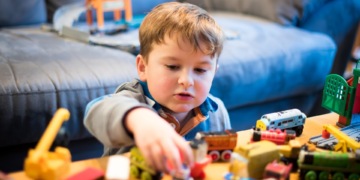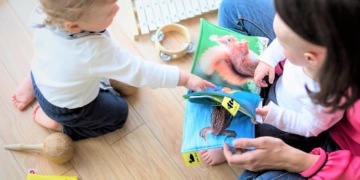Key Notes
- Children develop out of their own pace, including some skills of been learned far more quickly than others
- They will make an attempt to imitate those gestures through careful observation and imitation of their parents and other adult role models
- They will have no trouble sorting the items in their respective locations once they have mastered this skill
- Find opportunities for having to count practice during the day and incorporate them into your routine
- Looking at familiar objects in books or in any other setting allows them to recognize them as being familiar
- Increasing the chances of their child’s mental growth is a source of worry for a significant number of parents
Children develop at their own pace, including some skills of been learned far more quickly than others. Some skills can be learnt much more quickly than others.
Advancement is also, a procedure that has both a beginning and an ending. As your child gains proficiency in certain skills, he or she may find oneself or herself going to return to a preceding phase in these other areas for a short period of time.
If you have any questions or concerns about your child’s growth, you should consult with your pediatrician or nurse practitioner.
Observe the education sheets titled “Communication – language development: 24 to 30 days or weeks” and “Communication and language development: 30 to 36 months”.
Stages of Cognitive Developments In 2-3 Year Old’s
According to recent research, a child’s academic, cognitive, and social development appears to accelerate by leaps and bounds within the first year of life.
When it comes to raising children at this age, parents or caregivers must set excellent examples of behavior for their children because they spend a significant amount of time observing the actions of adults at this age.
Able To Identify Objects
The ability to recognize objects in their environment is developed in toddlers at an early stage and will become more independent as they get older.
Looking at familiar objects in books or in any other setting allows them to recognize them as being familiar. When they look in the mirror, they can easily tell the difference between themselves and their own reflection. A simple examination of the object’s size and structure will reveal the nature of the object to be encountered.
- Identify their own image in the mirror by calling it out by name
- Identify the various artefacts in a children’s book.
- Identify objects and people that are familiar to you in picture books.
Imitation
The gestures of adults, as well as the mannerisms of his or her parents or caregivers, become more noticeable and imitated as a child grows in age, among other things. They will make an attempt to imitate those gestures through careful observation and imitation of their parents and other adult role models. When children are young, they frequently imitate the actions and speech patterns of their parents, which can be frustrating.
Able To Sort Things
As children grow older, their ability to identify objects and place them in their proper order improves, and this is not a difficult task for them to complete. Having learned to identify an object, they will have no trouble sorting the items in their respective locations once they have mastered this skill.
Able To Make Sentences
It is possible for toddlers to use phrases of 2-3 words and say it out loud ‘I, you, as well as me’ as early as 2 years old and to use sentences of 3-4 words later on.
You are teaching and encouraging your child to learn and use a lot of vocabulary, which might also make someone to as well as person easier to understand when trying to speak. Toddlers are typically able to form phrases of 3-5 words, or even prolonged, by the time they reach the age of three years.
Can Make Choices
Provide your child with as many options as you are able to give them. “Would you prefer to wear the black t-shirt with the yellow shorts or the blue shorts?” is an example of a question.
If you prefer something else, you could say, “Would you like a string cheese burger or yoghurt with your lunch?” “Would you like to go to the park or go shopping?” is another option. His ability to become more self-sufficient and learn to make confident decisions that will have an impact on his day will be enhanced as a result of this.
Able To Play Games
Engage in a variety of games with your child to aid him or her in the development of problem-solving and creative thinking abilities.
For younger children, you can play “Peek-a-Boo” with them while you are putting together a structure out of Legos or other building blocks. For older children, you can engage them in activities like board games, puzzles, and “Hide-and-Seek” sessions to help them develop skills. They will be able to play with you.
- Sort the objects according to their segment (i.e., animals, flowers, trees, etc.)
- Simple instructions from parents and caretakers should be followed.
- Identify and respond to phrases
- Layer circles on a nail in descending order from smallest to largest
Learning School Activities
When you’re having a conversation with your child, pay close attention to the shapes and colors that he or she is using.
When playing in the yard, it is acceptable to say stuff like “It is a round, blue ball” or “That sign is a red lantern” when trying to approach a traffic light.
With time and maturity, you can ask him about specific objects and hear his descriptions of them. Find opportunities for having to count practice during the day and incorporate them into your routine. Count the amount of shoes in your child’s closet when he is getting dressed, or count the amount of slides on the play area when you are at the campground to him when you are out with him.
It’s conceivable that you’ll soon realize that you’re keeping track of every single thing. You can assist your child in identifying characters by chanting along to the “Rhymes,” learning to read about the alphabet, and engaging in alphabet puzzle play (Read here: Children Learning Reading Review: How To Teach Your Toddler To Read At Home!).
Examples to Increase Your Child’s Cognitive Development
Example 1:
In order for their children to actively discover the world between them as they grow older, families should help to inspire and inspire them. When dealing with young children, try to be as patient as possible with them, as they might have an unending stream of questionnaire about anything else in their immediate surroundings.
Example 2:
This implies that families are in a distinctive position to assist in the shaping of their children’s learning, thinking, and developmental processes.
Parents can help their children develop their intellectual abilities at home by assisting them in making sense of the world between them. When an infant expresses an interest in an artefact, parents can assist the child by allowing him or her to touch and start exploring the item while also explaining whatever the object is.
Final Words
Increasing the chances of their child’s mental growth is a source of worry for a significant number of parents. Young kids, on either hand, are keen to learn from the moment they are born into this world.
As a growing child’s life progresses, education will play an increasingly important role; however, close family relations, particularly those of us with mom and dad as well as other primary caregivers, are the most influential factors during those formative years.
By the time they reach the age of two, children are becoming increasingly self-sufficient in their daily lives. In light of their increased ability to explore the world, a significant amount of learning takes place during this stage as a result of their observations of themselves and others, as well as their observations of others.




























